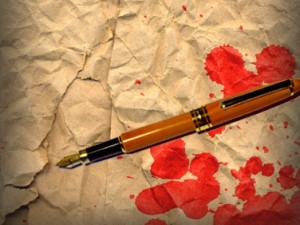Anti-press violence spirals upward in Pakistan: panel
Thursday, May 2nd, 2013 11:46:46 by Tahir Khan
Anti-press violence has spiraled upward in Pakistan over the past five years, propelling the country into the eighth worst spot on the index, a media panel’s analysis has found.
Although extremists and criminals pose serious risk, Committee to Protect Journalists (CJP) research shows that Pakistani political and intelligence operatives routinely target the press for attack.
“Police and prosecutors, in turn, face such severe political intimidation that they have been rendered incapable of prosecuting the crimes effectively”.
“The main reason for impunity is lack of government will to prosecute those that attack journalists,” said Owais Aslam Ali, head of the Pakistan Press Foundation. “It only takes a few successes to show impunity won’t be tolerated.”
But one case in Pakistan, the 2011 murder of Geo TV reporter Wali Khan Babar, shows how difficult that can be when the rule of law has broken down. Several suspects connected to one of the country’s leading political parties, the Muttahida Qaumi Movement, are facing trial, but the prosecution has been derailed by the murders of five people connected to the investigation, including witnesses and police officers.
In November 2012, an eyewitness was gunned down two days before he was due to give testimony.
Pakistan’s failure to prosecute a single suspect in the 23 journalist murders over the past decade has pushed it up two spots on the index. A new onslaught of violence came in 2012, with five murders.
One of the few cases to progress from investigation to trial was derailed last year when an eyewitness to the 2011 murder of Geo TV reporter Babar was gunned down two days before he was due to testify.
Pakistani news media are vibrant and unified in speaking out against impunity; in March, representatives of dozens of outlets and groups began crafting a plan to improve journalist safety as part of the U.N. effort. But any optimism is tempered by a stark reality: CPJ research shows that journalists face an astonishing array of threats, not only from militants and warlords but from military, security, and government officials.
The release of CPJ’s 2013 index comes at a pivotal moment in the global struggle against impunity. A U.N. plan to combat deadly anti-press violence gets under way this year, with Pakistan being an early focal point. Among its many measures, the plan aims to strengthen journalist safety programs and assist member states in developing ways to prosecute the killers of journalists.
CPJ’s analysis found intensifying anti-press violence in Pakistan as well as Somalia and Brazil—with the circumstances exacerbated by national leaders’ unwillingness or inability to address the problem.
On Afghanistan the CPJ says that no journalists have been murdered in Afghanistan since 2008, but authorities have shown no progress in pursuing suspects in the five unsolved cases over the past decade.
The most recent victim was Abdul Samad Rohani, Helmand correspondent for the BBC’s Pashto service and a contributor to the Pajhwok Afghan News agency. Rohani, abducted and shot in 2008, had recently reported on drug trafficking and its links to government officials.
The planned 2014 withdrawal of NATO troops has raised new concerns about the overall security climate and, with it, the news media’s safety.
Short URL: https://www.newspakistan.pk/?p=40091

















